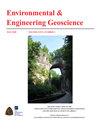Using an Inventory of Unstable Slopes to Prioritize Probabilistic Rockfall Modeling and Acid-Base Accounting in Great Smoky Mountains National Park
IF 0.7
4区 工程技术
Q4 ENGINEERING, ENVIRONMENTAL
引用次数: 0
Abstract
Abstract An important first step in the geotechnical asset management of Great Smoky Mountains National Park (GRSM) is the creation of an unstable slope inventory along major transportation corridors. Slope-stability problems are frequent in GRSM, often initiated in highly weathered and fractured metasedimentary rocks. In this study, an unstable slope inventory was created using the Unstable Slope Management Program for Federal Land Management Agencies protocols. Hazards and risks were evaluated for 285 unstable slopes along 243.67 km of roadway. Kernel density estimation was used to identify unstable slope hotspots and establish 14 sites for site-specific investigations to evaluate potential impacts of discrete unstable slopes along major roadways. Two-dimensional probabilistic rockfall simulations and acid-base accounting tests were used to predict rockfall pathways and evaluate the acid-producing potential of rocks. Simulations indicated that rock material would likely enter the roadway at all 14 sites. Acid-base accounting test results indicated that slaty rocks of the Anakeesta Formation and graphitic schist of the Wehutty Formation are primary acid-producing rocks in rockfall-prone areas. This research illustrates an approach for prioritizing areas for site-specific investigations towards the goal of improving safety in GRSM, including developing mitigation strategies for rockfall by widening ditches, installing barriers, and encapsulating acidic rockfall material.在大烟山国家公园使用不稳定斜坡清单优先考虑概率岩崩模型和酸碱核算
摘要:在大烟山国家公园(GRSM)的岩土资产管理中,重要的第一步是创建沿主要交通走廊的不稳定边坡清单。斜坡稳定性问题在GRSM中很常见,通常起源于高度风化和断裂的变质沉积岩。在本研究中,使用联邦土地管理机构协议的不稳定边坡管理程序创建了不稳定边坡清单。对243.67 km道路上285个不稳定边坡进行了危害和风险评价。采用核密度估计方法识别失稳边坡热点区,建立14个定点调查点,对主要道路沿线离散失稳边坡的潜在影响进行评价。采用二维概率岩崩模拟和酸碱核算试验预测岩崩路径,评价岩石的产酸潜力。模拟表明,岩石材料可能会在所有14个地点进入巷道。酸碱衡算试验结果表明,在岩落易发区,Anakeesta组板岩和Wehutty组石墨片岩是主要的产酸岩。这项研究阐明了一种方法,可以优先考虑针对特定地点的调查区域,以实现提高GRSM安全性的目标,包括通过拓宽沟渠、安装屏障和封装酸性落石材料来制定缓解落石的策略。
本文章由计算机程序翻译,如有差异,请以英文原文为准。
求助全文
约1分钟内获得全文
求助全文
来源期刊

Environmental & Engineering Geoscience
地学-地球科学综合
CiteScore
2.10
自引率
0.00%
发文量
25
审稿时长
>12 weeks
期刊介绍:
The Environmental & Engineering Geoscience Journal publishes peer-reviewed manuscripts that address issues relating to the interaction of people with hydrologic and geologic systems. Theoretical and applied contributions are appropriate, and the primary criteria for acceptance are scientific and technical merit.
 求助内容:
求助内容: 应助结果提醒方式:
应助结果提醒方式:


